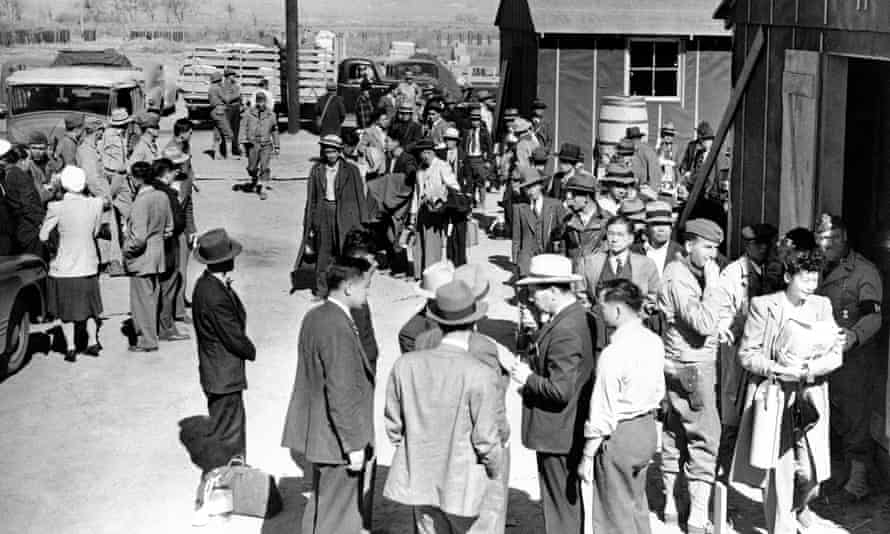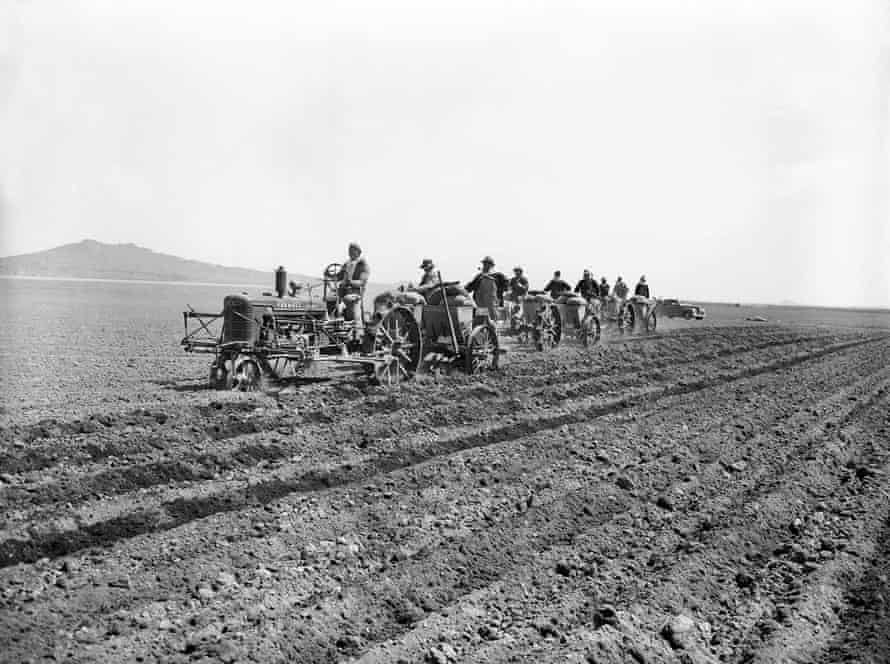Eighty years ago, as anti-Japanese fervor gripped the US, the parents and grandparents of the California congressman Mark Takano were among 120,000 Japanese Americans forcibly removed from their homes and sent to desolate camps scattered across the west.
They were allowed to take only what they could carry. Everything else was sold, stored or left behind. Confined by barbed wire fences and armed military guards, their only offense was looking like the enemy.
“They were incarcerated without any due process of law, never accused of a crime, never convicted of a crime but in an internment camp strictly because of their racial characteristics,” Takano told the Guardian.
Two-thirds of those interned were American citizens, like Takano’s maternal grandparents and paternal grandmother. Many were American-born children, like his parents, far too young to pose a threat to national security, as was the spurious claim.
What is remembered as one of the darkest chapters in American history was set in motion on 19 February 1942, 74 days after Japan attacked on Pearl Harbor, when Franklin Roosevelt signed Executive Order 9066.
On the 80th anniversary of Roosevelt’s order, an occasion marked by events from Hawaii to Idaho that will include many witnesses, Takano is worried.
“What I fear we’re in now is a moment of forgetting,” he said.

Since the onset of the coronavirus pandemic, the US has witnessed an alarming spike in violence and hate against Asian Americans. Toxic rhetoric and attacks on immigrants and racial and religious minorities have become a routine part of the political discourse in democracies around the world.
Takano warned of an “insidious nostalgia” that seeks to whitewash the shameful parts of American history. “It’s a hankering for a flawed America,” he said. “And its premise is that America should never evolve.”
It was a dangerous worldview, he said, encapsulated by Donald Trump’s promise to “make America great again”. Those who subscribed to it, he continued, “don’t want America to get better. They don’t want to see a more perfect union.”
It is why stories like his family’s are worth retelling and remembering.
Takano’s paternal grandfather was a teenager when he arrived in the US from Japan in 1916. He worked and saved until he had enough money to marry. So-called alien land laws prevented him from buying property and precluded him from becoming a citizen. But because his grandmother was a citizen, they were able to buy land in her name.
In the late 1930s, they purchased a five-acre plot of land in Bellevue, Washington, where they farmed strawberries, chrysanthemums and tomatoes to be sold at Pike’s Place Market in Seattle.
When war broke out, they were forced to leave their farm and sent to the Tule Lake internment camp in northern California. Their incarceration lasted until the end of the war, he said.
His father bore the physical scars from his internment: burns on his legs from when he fell into an incineration pit. “When he wore short pants, his shins were all discolored,” Takano said.
There were emotional scars, too.
After their release, Takano said his paternal grandfather wanted to return to Japan. But his paternal grandmother, who was born in America and knew little of Japan, did not want to leave.
His grandparents nearly boarded a ship bound for Japan, Takano said, but his grandmother experienced a mental breakdown from which he said she never recovered. “To have all of this intersect at once – they get out of the camps but the woes are not over,” he said “You can imagine how stressful and traumatic it was.”
Robbed of his property and now his wife’s health, his grandfather raised his young children with the help of his extended family and the tight-knit Japanese American community in southern California.
When Takano was 10, he boarded a plane for the first time and flew with his grandfather to Washington. Together they visited the property his family had once owned, “the place where he had had a stake in the American dream and lost it”.
At the time, Takano said a Holiday Inn occupied part of the land, situated in what is now the heart of the state’s prosperous tech industry. Elsewhere, he remembers seeing remnants of the old greenhouses, vestiges of a dream deferred.
In the eight decades since Roosevelt signed the order, the federal government as well as state and local governments have sought to make amends.
In 1983, the Federal Commission on Wartime Relocation and Internment of Civilians concluded that the incarceration of Japanese Americans was a “grave injustice” motivated by “racial prejudice, war hysteria and failure of political leadership”. Five years later, the US issued a formal apology and paid Japanese American survivors $20,000 each for violations of their civil liberties and constitutional rights.
In 2020, California also a formally apologized for the central role it played in the internment of Japanese Americans.

Last week, the US Senate passed legislation to create a national historic site on a rural patch of land in south-eastern Colorado known as Camp Amache, where more than 7,000 Japanese Americans and Japanese nationals were imprisoned from 1942 and 1945.
In a presidential proclamation commemorating Saturday as a Day of Remembrance, Joe Biden reaffirmed “the Federal Government’s formal apology to Japanese Americans whose lives were irreparably harmed during this dark period of our history, and we solemnly reflect on our collective moral responsibility to ensure that our Nation never again engages in such un-American acts”.
“I have always believed that great nations do not ignore their most painful moments – they confront them with honesty and, in doing so, learn from them and grow stronger as a result,” he said. “The incarceration of Japanese Americans 80 years ago is a reminder to us today of the tragic consequences we invite when we allow racism, fear, and xenophobia to fester.”
Takano, now chair of the House veterans committee, is particularly proud of his great-uncle, who fought fascism in Europe as part of the US army’s highly decorated 442nd regimental combat team even as his family was interned in the US.
“It’s the contradiction of a country that is fighting fascism, but has some of the seeds of it in its own backyard,” he said.
His great-uncle died in Italy just weeks before the end of the war in 1945, he said.
“I think of my uncle as betting his life on the promise of what America could be and what the world could be,” he said. “And the fact that I’m a member of Congress today I hold out as an example that my uncle won his bet.”
But he urged vigilance.
“We’re in danger of forgetting and we’re in danger of this nefarious nostalgia,” he said. “These two things put all of that at risk.”


Comments